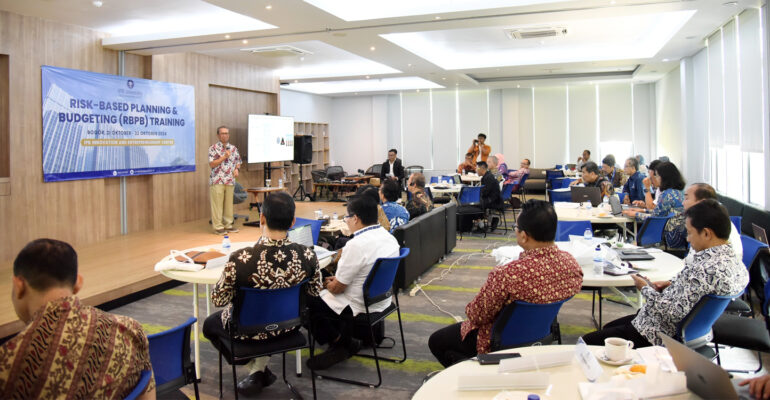IPB University Holds Risk-Based Planning & Budgeting Training for Organisational Efficiency and Sustainability

IPB University’s Risk Management Office (KMR) held a Risk-Based Planning & Budgeting training at the Innopreneurship Center Building, IPB Dramaga Campus, Bogor (22/10). This activity aims to improve operational efficiency and ensure the achievement of organisational targets more effectively and sustainably.
Secretary of IPB University, Prof Agus Purwito in his speech said that IPB University will continue to provide an in-depth understanding of risk management.
According to him, the risks often faced include academic and non-academic aspects, so that planning and budgeting must also be risk-based. He added that the risks inherent in the position and responsibilities of the main tasks and functions (tupoksi) must be identified and managed properly.
“Institutions also have regulations related to risk management that are always updated, covering reputation, academic, and other aspects. Hopefully, this event can provide enlightenment about risk management, especially those related to the responsibilities and duties of each position,” he said.
The Chief of KMR IPB University, Ir Budi Purwanto, ME stated that this activity focused on improving technical skills and strengthening organisational resilience in daily operations. The resource persons presented were also experienced professionals in the field of risk management.
“One of the main objectives is to integrate risk management in the budget. This activity also includes interactive discussions related to risk-based state financial management. Hopefully, this activity will run smoothly and risk management practices can be implemented optimally,” he said.
Present as a guest speaker was the Risk Monitoring Committee of PT Jasaraharja Putera, Robert AL Nahlohy. On that occasion, he explained the importance of risk management in the strategic planning process, especially in risk-based planning and budgeting.
“This concept integrates risk management into the preparation of work plans and budgets, so that risks can be identified, assessed, and controlled effectively,” he said.
Robert added that the risk management policy implemented also refers to the ISO 9001:2015 standard. This standard ensures that the planning and budgeting process runs in accordance with applicable quality management principles.
“Thus, all work units can minimise potential risks and achieve strategic goals more effectively and efficiently,” Robert said. (dr/Rz) (IAAS/RSL)



